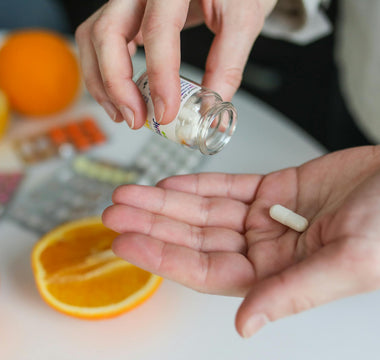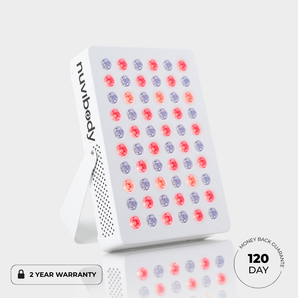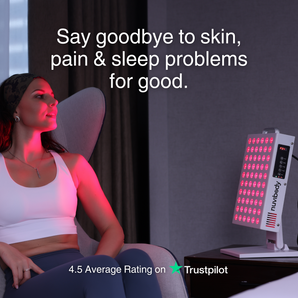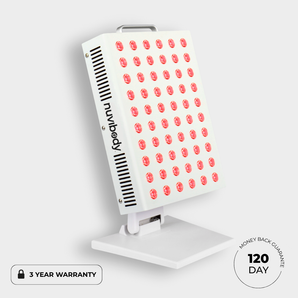Cortisol is often called the "stress hormone." It plays a crucial role in our bodies, from regulating blood sugar levels to influencing our immune system. But long-term elevated cortisol levels can lead to symptoms such as fatigue, weight gain, anxiety, sleep problems, and even a weakened immune system.
Many people turn to supplements when they're stressed, but did you know there are also completely natural ways to lower your cortisol levels—without pills or powders? Below are proven strategies you can use daily.
Understand the role of cortisol
Cortisol is produced by the adrenal glands in response to stress. In acute situations, it helps your body stay alert and react quickly. Think of the classic " fight or flight " system.
The problem arises when stress becomes chronic. Cortisol levels then remain elevated for too long, disrupting recovery processes. This can lead to sleep problems, hormonal imbalances, and impaired digestion.
Get regular exercise
Moderate, consistent exercise helps lower cortisol levels and reduce stress. Think walking, cycling, yoga, or light strength training. It's important not to overdo it: extremely intense exercise can actually temporarily increase cortisol levels.
It's best to exercise actively for 20 to 40 minutes every day. Schedule this for a fixed time each day, for example, in the morning or after work.
Optimize your sleep rhythm
Sleep is one of the most powerful natural cortisol regulators. Poor sleep can directly increase your stress hormones.
- Maintain a regular sleep and wake rhythm, even on weekends.
- Avoid bright screen light an hour before bedtime.
- Make sure your bedroom is cool, dark and quiet.
Some people find that an evening routine involving relaxing activities, such as breathing exercises or brief exposure to red light therapy , helps them fall into deep sleep more quickly. This can contribute to a more natural drop in cortisol levels at night.

Use breathing and meditation as a relaxation anchor
Slow, deep breathing and meditation are scientifically proven ways to calm the nervous system ( source ). When your nervous system switches to parasympathetic mode ("rest and digest"), your heart rate decreases, your muscles relax, and the production of stress hormones decreases.
Start with 5 to 10 minutes a day. Popular methods include box breathing (inhale for 4 seconds, hold for 4 seconds, exhale for 4 seconds, pause for 4 seconds) or guided meditations via an app.
Spend time in nature
Natural environments have a proven calming effect on both body and mind. Even 20 minutes in a park, forest, or by the water can noticeably reduce your stress levels. Seeing greenery, hearing natural sounds, and feeling fresh air help lower cortisol and improve your mood.
Make it a habit to get outside every day, preferably in the morning for extra light exposure — good for both your body clock and your stress levels.
Eat foods that support your hormones
What you eat affects your hormone balance. Avoid overly processed foods, sugar, and caffeine, as these can cause cortisol spikes. Instead, choose:
- Whole grain products
- Lots of fruits and vegetables
- Healthy fats (avocado, nuts, olive oil)
- Lean proteins (fish, chicken, legumes)
Hydration is also important. A slight dehydration can activate the stress system.

Minimize unnecessary stress stimuli
Not all stress can be avoided, but we often have more control over it than we think. Some examples:
- Schedule buffer time between appointments.
- Turn off notifications on your phone.
- Spend less time on social media.
By consciously dealing with your stimuli, you give your body more moments of rest, which allows cortisol levels to normalize more quickly.
Red light therapy as additional support
While red light therapy is known for its benefits such as skin improvement and pain relief , studies suggest it can also promote relaxation and recovery. By optimizing cell energy and reducing inflammation, it may indirectly help regulate stress responses ( source ).
Nuvibody devices are among the most powerful on the market, CE certified, and safety-tested. With a 120-day return policy, a 3-year warranty, and the option to shop with Klarna, you can easily discover whether this technology can help you achieve better balance in your stress levels.

Build a personal stress-reducing routine
The key to permanently lower cortisol levels lies in consistency. Choose two to three strategies that fit your lifestyle and implement them daily. These might include:
- 30 minutes walk
- 10 minutes of breathing exercises
- A fixed sleep routine with relaxing light in the evening
By stacking small, achievable habits, you'll have a powerful effect on your overall stress levels over time.
A natural way to less stress
You don't need supplements to lower your cortisol levels. With the right combination of sleep , exercise, relaxation, and a healthy diet, you can restore your hormone balance completely naturally.
Whether you start spending more time outdoors, do breathing exercises, or adjust your evening routine, give yourself time to notice the difference. Want to further support your recovery process? Then incorporating red light therapy into your routine can be a valuable addition.
Frequently asked questions and answers
1. How quickly can my cortisol levels drop if I change my lifestyle?
The rate at which cortisol levels decrease varies from person to person and depends on factors such as sleep quality , diet, and stress levels. For some, improvements are measurable within a few days, while others experience clear effects only after several weeks of consistent adjustments. It's important to be patient and focus on developing long-term habits.
2. Is measuring cortisol useful before making changes?
Yes, but it doesn't always have to be through blood tests. Saliva or urine tests can provide insight into your daily cortisol pattern. This can be useful if you want to link symptoms to measurable values or track your progress.
3. Can too little cortisol also be a problem?
Absolutely. Although high cortisol levels often get the attention they deserve, a chronic deficiency can lead to fatigue, low blood pressure, dizziness, and reduced stress resistance. Therefore, the goal is always balance, not as low as possible.
4. Does the time of day I exercise affect my cortisol?
Yes. Intense exercise right before bed can temporarily increase your cortisol and disrupt your sleep. For most people, exercising in the morning or early afternoon works better for regulating stress.
5. How does screen use affect my cortisol levels?
Bright blue light from phones, tablets, and computers can inhibit your melatonin production and indirectly disrupt your cortisol levels. This keeps your body in "active mode" longer, delaying the natural decline in cortisol levels.
6. Can red light therapy also help with stress during the day?
Yes, short sessions of red light therapy during the day can contribute to relaxation and muscle recovery, thus indirectly reducing stress. It doesn't disrupt your circadian rhythm like bright white or blue light can.
7. What role does breathing play in directly lowering cortisol?
Slow, deep breathing activates the vagus nerve, which stimulates the parasympathetic nervous system. This lowers your heart rate, relaxes your body, and often reduces cortisol production within minutes.
8. How can nutrition affect my stress hormones in the long run?
Foods high in processed sugars and caffeine can cause repeated, small spikes in cortisol. A well-balanced diet with sufficient protein, healthy fats, and fiber helps keep blood sugar levels stable and prevents unnecessary hormonal stress responses.
9. Is there a difference in cortisol regulation between men and women?
Yes, hormonal cycles, menopause, and pregnancy can influence stress sensitivity and cortisol production. Therefore, the optimal approach to lowering cortisol may vary by gender and life stage.
10. How do I prevent my cortisol from rising again after it has normalized?
The most important thing is to maintain your new habits. Combine regular relaxation times, sufficient sleep , a healthy diet, and possibly supportive tools like red light therapy . Consistency is key to preventing relapse.



















